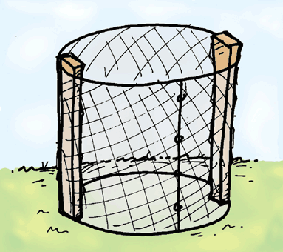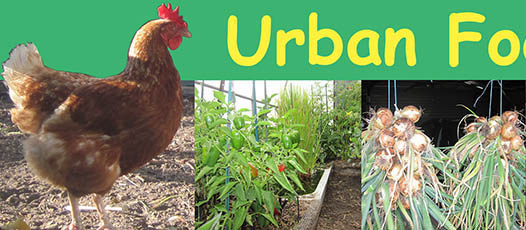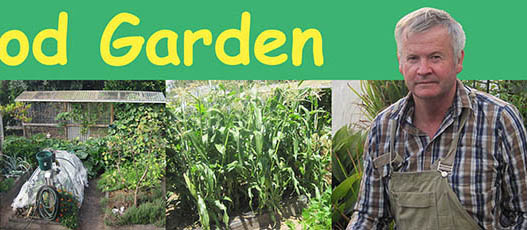composting
wire Compost
Bins
Probably the cheapest
and simplest way to build large compost bins suitable for bigger
gardens is to make them out of chicken wire. To do this you :-
A. Cut and roll into a
circle a piece of chicken
wire

Role a length of chicken wire into a circle, tie ends together and support with stakes.

Fill with compostable material. When the compost process is finished simply untie the ends and peel wire away.
b. place the wire into a
circle
Roll the wire into a circle and tie ends together. Place one end of the wire on the ground and drive two or
three garden stakes or star pickets into the ground just inside
the wire. This should keep the wire in an upright position.
Loosely tie the stakes to the wire with string. c. fill with compostable
material
Fill with green waste as per the usual method of making
compost. D. Remove chicken wire
When the composting process has finished simply untie the
chicken wire and peel it back. This should give you a neat pile
of compost that is ready to shovel onto your garden. Like Plastic Compost Bins wire bins are much more mobile and can be moved to where the material that needs to be composted is, rather than carting it to the compost bin.
While wire compost bins can be very useful there are four main problems with them.
1. Risk of drying out
The
bacteria needed to break down organic matter requires moist
conditions to thrive. If the compost becomes too dry it can slow down the
composting process and effect it's quality. Because
wire compost bins are more ventilated than other types of
bins they are at greater risk of drying out.2. Susceptible to couch grass
infestations
If you have Couch grass growing in the soil around a
chicken wire compost bin the Couch will rapidly invade your
compost. Not only will you have a major weeding job on your
hand but it will make the compost useless as even the smallest
piece of Couch rootstock left in the compost will quickly
regrow. So if you spread your compost onto your garden you are
very likely to spread the Couch.4. Sprouting of weed seeds
Sunlight flooding in through
the chicken wire will cause seeds in the sides of the compost to
sprout. If there are weed seeds in the compost bin then this
can be quite a problem. In bins with wooden or plastic sides
this is less likely to happen. However these problems in using wire compost bins can be overcome. Materials such as Hessian bags or old carpet underfelt placed on top of the bins will both reduce evaporation and retard seed germination, at least at the top of the compost bin. And, if you have chickens, by placing the bins in your chicken run you will eliminate most of the sprouting weeds because the chickens will constantly peck and scratch around and on top of the bins. See Compost Bins in the Chicken Run for details.
Although not as good as wooden or corrugated iron bins the ease of construction and relative low cost of chicken wire bins make them well worth considering.

